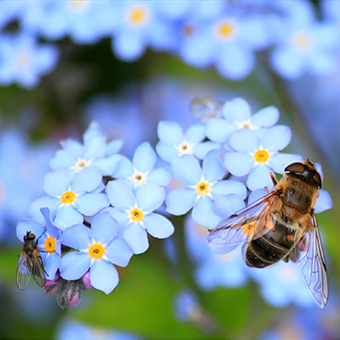
Our Spring Special: 13 Tips for Avoiding Pollen
In spring, allergy sufferers have a difficult time. Due to the high pollen count, many people are affected by hay fever, which presents with an itching and burning sensation in the eyes and nose, coughing or the presence of allergic asthma. If the symptoms are not treated with various measures, inhaled pollen can impact the lungs, which can lead to bronchitis or asthma. Few people realize that the heart can also be affected. Chronic inflammation and lung disease can place stress on the heart, making the heart work harder. This excess burden can lead to heart failure. However, there are measures that allergy sufferers can take to alleviate the symptoms and to reduce the stress on the heart. Read our tips to help get through daily life during allergy season more comfortably.
What you can do to battle symptoms:*
- A daily nasal cleansing with salt water rinses out the pollen and disinfects the nasal mucosa, thereby strengthening it.
- Butterbur tablets dilate the bronchi and alleviate inflammatory asthmatic reactions.
- Dried-out mucosa provides a breeding ground for bacteria and viruses, and can be rubbed with Dexpanthenol 3x daily.
- Vapors with dill or fennel oil help treat congested bronchi.
- Cool face masks or peppermint oil alleviate tension headaches.
- Yoga and relaxation exercises help fight stress, which can make hay fever and its symptoms worse due to histamine release.
- Euphrasia diluted with water used as an eye cover reduces itching
*Please consult your doctor or pharmacist for more information or to inquire re: any possible side effects
What you can do to battle symptoms:*
- A daily nasal cleansing with salt water rinses out the pollen and disinfects the nasal mucosa, thereby strengthening it.
- Butterbur tablets dilate the bronchi and alleviate inflammatory asthmatic reactions.
- Dried-out mucosa provides a breeding ground for bacteria and viruses, and can be rubbed with Dexpanthenol 3x daily.
- Vapors with dill or fennel oil help treat congested bronchi.
- Cool face masks or peppermint oil alleviate tension headaches.
- Yoga and relaxation exercises help fight stress, which can make hay fever and its symptoms worse due to histamine release.
- Euphrasia diluted with water used as an eye cover reduces itching
*Please consult your doctor or pharmacist for more information or to inquire re: any possible side effects
13 Tips for Avoiding Pollen
This helps you to avoid unnecessary stress on your immune system.
It is best to ventilate in the city between 6am and 8am, and in the countryside between 8pm and midnight, when there is the least amount of pollen in the air. When it is very windy it is best to avoid ventilating. Protective window screens can also decrease the pollen load.
Remove dust and pollen on a regular basis from your apartment by using a wet cloth or a vacuum with a pollen filter (this should be regularly changed). Avoid rugs to which pollen easily attaches.
Do not get undressed in the bedroom, as clothes are full of pollen. Avoid hanging your clothes outside to dry, and regularly wash your bedding.
Most pollen is found in your hair. When unwashed, pollen transfers onto your pillow, which you then breathe in at night.
During pollen season, avoid strenuous physical activity outside. When you breathe deeper, more pollen enters the airway. It is preferable to train indoors when the pollen count is high.
When it has rained for longer than 15 minutes, use this time to get outside in the fresh pollen-free air.
This helps avoid pollen directly entering the eyes and alleviates itching.
Close the windows when driving and have a pollen filter installed.
Those who react to birch or hazelnuts often do not tolerate carrots, apples or nuts. Those allergic to grass may also react to peppers or parsley. Allergens can be destroyed by heating or freezing food products.
The air is pollen-free above 2,000 meters. The air by the ocean or in the desert is also low in pollen.
Antihistamines alleviate the symptoms of allergies and should be taken shortly before pollen is present to best prevent symptoms. You can therefore prevent a conversion from hay fever to asthma. Eye and nasal drops can also temporarily relieve symptoms.
Allergy injections administered by your physician are given until the undesired allergic reaction stays away.



